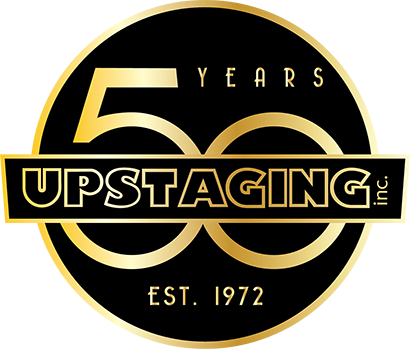
Founded in 1972, live entertainment lighting, video, scenic fabrication, and trucking company Upstaging marked its 50th anniversary in 2022. Co-Founders, brothers Robert and Don Carone, and Robin Shaw started the company when touring wasn’t yet a well-defined segment of the production industry. During the past half century the three, joined by John Huddleston in 1979, have grown Upstaging into a stalwart of the industry. Recently, PLSN caught up with them to talk about reaching this golden anniversary and they shared some of their reflections on the past 50 years—the beginnings, the milestones, and what they hope people know about Upstaging today.

Let’s Start a Company
When asked how they got started, “I always find it hard to say when the beginning began,” comments Shaw. “That’s a tricky question to answer because a lot of things happened before it started, and then you look and realize it had started. We were producing concerts in a high school field house, and we had to buy equipment to put shows on there. So we had equipment but not the idea of the company it would be at the start.”
When I asked Robert Carone what drew him to live entertainment, he quickly answered, “Music. My father was a musician and I’d played drums since the sixth grade.” He continued to explain, “In high school I was in the student government and being a musician, I was on the committee that ran the dance concerts. That was pretty fun, so from that a couple of my student buddies and I decided we were going to be promoters. We were going to promote a series of shows over the summer, and if we’re going to do that all summer long, why rent lights? We might as well buy them. Which we did. We didn’t do well as promoters; lost all the money, but we did end up with the lights. It was 1972—we had 12 Fresnels and Lekos; nothing like it is now, but that was the start.”
Initially, the lighting enterprise was based out of half of the Carone family’s two-car garage where it quickly became a family business, with Robert’s brother Don joining him to help out. “Robert is two years older, so he was 17 and I was 15 at the time,” states Don. “I was a hockey player in high school—a lot of our first employees were actually hockey players from my high school. Robert was more of a music fan than me. Our father, Don, played saxophone for Stan Kenton in the ‘50s, so music was in our blood. I was drawn to it by fate, I’d guess you’d say.”
Robin and Robert were friends, and “he had a passion for music; I just happened to hop along for the ride,” she recalls. “I was still in high school and didn’t really know what I wanted to do, so I thought I’d do this until I figured it out. Then at some point I realized I was doing a lot of pretty interesting things and never looked back. The touring industry was very young when I started, and probably most of us… well, almost all of us at our company, began our careers in those early days. It was great because we just had to forge a path and pioneer the way. I loved figuring things out and solving problems. I really found the live entertainment industry exciting and challenging, and I still do. Being friends with Robert drew me there and the business itself kept me there.”
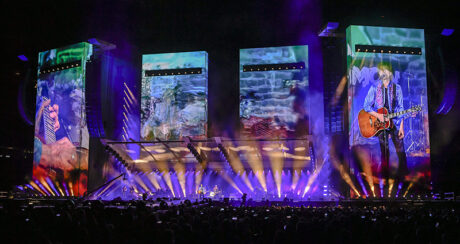
We Have Lights, We Could Do That
Once their promotion business folded, the agent for one of the bands still wanted to move forward, so they arranged for another promoter to work with Carone’s ‘lighting company.’ “The agent told us we could make a deal with them,” says Robert. “When we went to their office to hammer out that deal, somebody there mentioned that they had nobody to do lights for Black Sabbath that coming weekend in Dubuque, IA. I overheard that and quickly said, ‘Well, we have lights, we could do it.’ And that’s how we got into the lighting business!”
Back in 1972, the lighting equipment was pretty rudimentary and for a tour it consisted of whatever you found on hand at the venues. Don shared a story of running lights for Badfinger as an example. “One funny thing I remember about our high school field house was we had an old auto transformer dimmer system, one of those big, huge things with big levers. I think we had three colors, red, blue, and yellow. I was running the lights for Badfinger, and I remember this English guy with the band yelling at me during the show ‘more umber, more umber,’ and I’m thinking, ‘what the hell is umber?’ That was how things were done, with no real plan for the lighting, no design.”
When summer rolled around and they started lighting more bands, they didn’t have enough equipment to do all the shows, so they worked with a local theater rental shop to supplement their equipment through subrentals. For transport Robert remembers that “down the street was a Ryder Trucks rental location. We would get a 12’ Ryder truck, put the lights in, and go do half a dozen shows around the Midwest. We would have to put down a deposit each time and one day the manager said, ‘Why don’t you guys fill out a credit application? I’ll tell them you’re okay and you’ll get Ryder billing.’”
“And lo and behold, Ryder gave us a line of credit and we started to rent tractors and trailers,” Shaw notes. “We were providing lighting equipment for local shows all around us. Robert, Don, John, George, and a few other people, would drive to the shows, set up the lights, and take them down and return them. That’s how the early days were. Eventually, we bought a straight truck with a sleeper. Now instead of sleeping in the passenger seat slumped over, somebody could actually sleep in the sleeper. I remember that being a really big deal, because that let us cover a wider area to do concerts.”
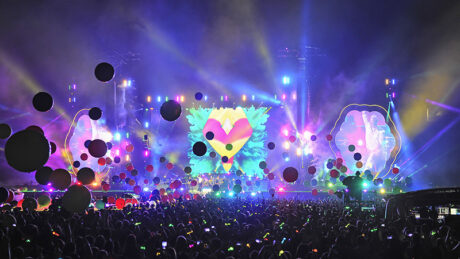
A Family Operation
“I think people generally thought we were nuts just doing this,” says Don. “I would add that our parents were really supportive. They were so instrumental in this, letting us start in their garage. It was a small three-bedroom ranch in Des Plaines, IL. There were five kids, seven people in the house, and we took up half of that two-car garage to store the equipment. Before a tour, we would set it all up in the front yard. I always think ‘what did our parents think about all this?’ They were our first office.” Robert describes loading out and hitting the road, with provisions. “We’d back the Ryder truck up to our garage, load-up, and get ready to go while our Mom would bake us chocolate chip cookies and pack us sandwiches, then we’d drive away.”
In these early days, communications were an issue. This was well before cell phones; you had to rely on payphones. “For example, when Robert left driving a straight truck heading to Greensboro, NC,” explains Don. “People with the band called the house, telling my mother, ‘you have to get ahold of Robert, that show has been canceled. He’s now got to go somewhere else.’ You think about it then, there’s no technology. If he doesn’t stop at a payphone and call home, he’s still going to head to the original place. Our mother was the accountant; our father helped out too. They were just our parents—Don and Jean—but they were a huge part of this. Without them at the start, we probably wouldn’t be talking about Upstaging, now, 50 years later.” When Upstaging outgrew the Carones’ garage, they next shared space with the theatrical rental house they had been sub-renting gear from and then they moved on to their own shop in Elk Grove Village around 1974.
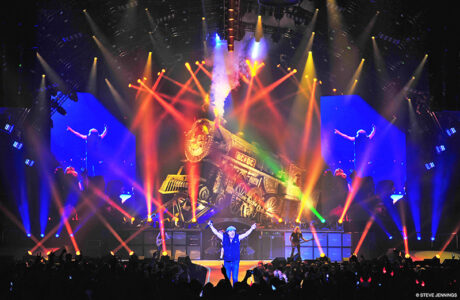
No Rules; Fake it till You Make it
In those early days of touring for the production side, pretty much everybody was making it all up as they went along, because there were really no rules or set ways of doing things. It was an interesting time to grow your production company. “As I said earlier, at that time we were pioneering the way,” says Shaw. “Nobody was telling anybody how to do this because nobody really knew what they were doing. You almost had to fake it till you make it. You just had to pretend like you knew what you were doing. And quite honestly, if somebody made a mistake, nobody really knew. You knew you made a mistake. I remember many times when I made a mistake going, ‘Oh man. How come I didn’t see that?’ I was hard on myself, thinking ‘Why didn’t I see that coming?’ But like any mistake that you make, you learn from it, and you move on, and you learn not to do that again. That is what we all did, but yeah, it was pretty wild at the beginning.”
Upstaging’s main work was lighting a lot of small, local shows in the beginning. “We worked with a lot of local bands. We did Styx, who back then were playing high schools in the Chicago area every Friday and Saturday night,” notes Don. “Then, later on, REO Speedwagon opened up as a little local band; then when they got bigger we would move up to those shows. It was just different bands that we started with young and got to grow with. Cheap Trick was one that we started with in small clubs then moved with them when they played stadiums. Cheap Trick was probably the first where we went from 10 lights a side to playing Dodger Stadium and places like that. We were just kids; the band was kids. Everybody was in the same hotel, and you hung out with them and got to know their families and kids. That’s one of the biggest changes; the bands are so isolated now.”
Upstaging continued working with more and more bands—mostly local Midwest-based acts—doing one-off shows. Touring as it exists today, wasn’t really done back then. As they worked with one act, they’d meet and build relationships with other bands on the same bill. Many of these bands would remain with Upstaging over the years. “I think the progression that really made a difference for us was when we started was that there wasn’t really tours like we think of touring today,” Robert states. “You’d do a half a dozen Sha Na Na dates, you do a half a dozen Joe Walsh dates around the Midwest. We did a lot of REO Speedwagon dates, and from REO, we got Lynyrd Skynyrd, because they were an opening act. Then people started carrying lights with them on tour, I think our first big one was probably KISS. From KISS we got Bob Seger and Cheap Trick because they opened for KISS. That started the relationships with those acts. So, that progression was pivotal.”
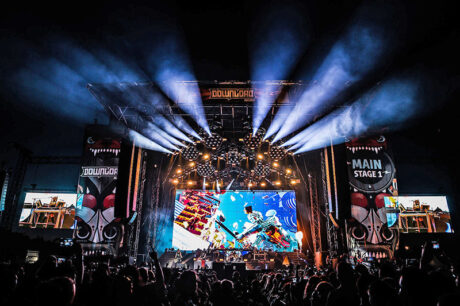
Becoming More Professional
KISS was one of the bands that really took production seriously at the time; back then they had Lighting Designer Jules Fisher designing their shows. “Getting KISS as a client—and working with Jules Fisher—helped us grow to a new, more professional level,” continues Robert. “We would have to go to New York for pre-production meetings for the KISS tour, which at that time was pretty much unheard of. We needed to be in Manhattan at nine o’clock on a Monday. We gained a new level of professionalism doing that tour. We were a bunch of hippies, and like everybody else, we were just digging the music and running around the country. That KISS tour took it to another level; it was a business and now we were getting production notes. So, that was pretty pivotal, not just the fact that we garnered other clients from working with KISS, but the professionalism we learned from Jules Fisher as well. Another influential person was Lighting Designer Mark Kruger, who we did Hall & Oates with. He taught us to write memos. He taught us various things that were beyond the just, ‘hey man, everything’s going to be cool!’ Those shows were part of bringing professionalism to the business side of it.”
Relationships matter in the entertainment industry, and the production side is no different. Being at the right place at the right time is one way to look at it, but the team at Upstaging took those connections and opportunities and made the most of them. Many would lay the foundation for long term relationships with artists and designers. “My first really big moment—and there were a lot of moments—but a very good friend of mine, worked A&R at A&M Records,” Shaw explains. “He gave me a cassette copy of this song called ‘Roxanne’ by The Police, and said, ‘A&M Records, this is their project and this band’s going to be the biggest band in the world.’ He gave me their manager, Miles Copeland’s phone number. Prior to that, we were doing mostly, not just Midwest, but certainly in that general area, bands like Styx, Bob Seger, Prince, KISS. This was the first time where this is an English band, and my friend gave me their manager’s number. I called Miles’ office and I spoke to his assistant, Kathy Gallagher, who we still work with now. She said, ‘Sure, can you come to New York and discuss this?’ I was just like, ‘Sure.’ Now, quite honestly, I’d never gotten on a plane to do this before, but I got on the plane and met with them. That began our history with The Police, lighting and trucking-wise, and that continues to this day with Sting.”
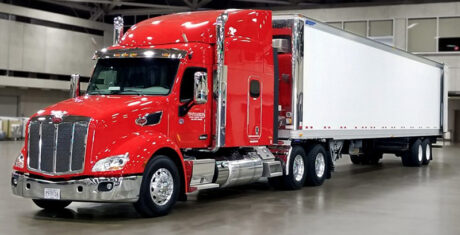
We Can Transport Your Equipment as Well
In another case of happening to be at the right place at the right time, Robert tells a simple story of how Upstaging added trucking to their service offerings. “Around ‘74, ‘75, we’re doing KISS, which was really a proper tour. There was one semi-truck on that tour that the sound company had arranged for—we were still in our 22’ truck. At one point during the tour, the sound company’s driver took the truck to Hertz for service, and Hertz took the keys away because the sound company wasn’t paying the bills. The KISS guys called us and said, ‘Hey, you’ve got an arrangement with Ryder. Can you work something out here?” So, we did and finished up the tour. That’s the short story of how we first got in the trucking business.”
The longer story was as Upstaging grew, Robert saw that there was a need that needed filling—entertainment trucking. There weren’t many dedicated companies that specialized in transportation for the live entertainment market. He felt that it was important for Upstaging to own its own transportation. “When it came to trucking, I think it was mostly a matter of happenstance and filling a need,” describes Shaw. “People needed it. There weren’t very many trucking companies, and we were fortunate to be in a position to get into the trucking. Robert spearheaded that in a really strong way. He was always interested in that side, and there was a need. We already had the clients, so there was no reason not to say, ‘Hey, we can transport your equipment as well.’ I think it was basically, no further than opportunity and need presented itself. Eventually we bought trucking equipment from Great Dane, and we were able to provide transportation for our clients.”
Upstaging’s red tractors and white trailers are now very iconic in the industry. When you see those outside a stadium or arena, and you know there’s a show going on there. “Everybody knows the trucks,” agrees Shaw. “I have friends who sort of know what I do and know my company name, but don’t really know what we do. But if they’re walking by our trucks at a venue, they’ll take a picture and send it to me. Even a lot of artists, especially in the early days, loved the trucks. I mean, who doesn’t like a truck?”
Like the equipment end of things, the trucking offerings have evolved over the years. “Doing trucking in the mid-70’s was big; there was us and Ego Trips, apart from Clark Transfer, the theater guys,” Robert explains. “Something pivotal for us in trucking was, when state by state trailer lengths regulations were changing from 45’ to 48’, but it wasn’t Federal, so a few states hadn’t gone with it yet. But we went ahead and ordered 48’ trailers. The perception was that you got more for your money, and that helped us get a lot of clients. The other thing that we did was change our bidding structure to an all-inclusive weekly price, rather than so much a day, so much a mile. Production accountants liked that as they could budget better. They knew exactly what they were faced with. It wasn’t a variable dependent upon mileage or other factors.”
Expanding the Talent Pool
As Upstaging continued its upward trajectory, they needed more people to work in the shop and work on the shows. Don Carone expanded his reach out to others, to friends of friends, to come in to help out. John Huddleston was a neighborhood friend of some of the high school hockey players that played—and worked with—Don. They asked Huddleston for some help working shows. “My friends were already working at Upstaging so I thought ‘why not.’ They were my circle of friends and they needed help,” says Huddleston. “I was working at Continental Airlines at O’Hare Airport when I was 18 as a summer job at the time. When I wasn’t at that job I would go over and help out at Upstaging; building some of the lighting systems, that was in 1979. Then they asked me if I could go out on the road, I said yes and I’ve been here ever since.” At the time, it was for a Cheap Trick tour that Upstaging was short of crew. “It sounded like fun, so I went out,” comments Huddleston.
“My plan had been going back and forth to college, but at one point I was like, ‘well, I’ll take a year off,’ and here I am today.” Eventually he would come off the road and start working in the shop. “I stopped touring around 1987. They needed somebody to keep an eye on the office, and we were a small company; there was only a handful of us through the early years of ‘79 to ‘87, there were people that came and went, some freelance people that toured and some other people that were full time, but it wasn’t a big company, at times it was under 15 people.”
Pivotal Shows
As companies grow and expand, there are always those shows that move them up to the next level; ones that are milestones in the evolution of a company. Upstaging has a few of those, all depending on who you ask as everyone has their own sense of milestone production. “For me, it would be moving into arenas then stadium shows,” says Don. “My first arena tour was with Lynyrd Skynyrd in ‘75 when I was 15. That was a big deal; it was a real tour. It was the first time I went to Florida, I remember thinking, ‘wow, it’s warm here and the streets are really nice.’ Getting McCartney was a big deal; once you’ve worked with a Beatle. When people ask us, ‘can you do this?’ I reply, ‘hey, we do a Beatle! He trusts us.’”
For Robert, he goes back to KISS being that pivotal tour. “The pivotal one for me would be KISS, and from that came Cheap Trick, and then Bob Seger. They both were opening acts for KISS. We had a very intense relationship early on with Cheap Trick. They were from Rockford, IL, which is actually very near Sycamore where we’re based. They pretty much handed the ball to us. That was great, and that took us to the next level. We also had a very close relationship with Seger. Later on, the Eagles were very important to our growth. And certainly the first Paul McCartney comeback tour. You look at shows like McCartney’s and say, ‘this is incredible. The design’s fantastic, the whole production is fantastic, and the music is fantastic.’”
For Shaw, the big moment was working in support of The Police and handling their touring needs. “That had a snowballing effect,” she comments. “Because when production managers, managers, and artists saw what we were capable of doing on that tour—probably one of the largest tours in the world, certainly in the country at that time—it snowballed. From there, opening bands would reach out to us. I would be at as many shows as I could so I could meet other managers and production managers so that we could start working with other bands. Because we could say, ‘Hey, we do The Police. We do this, we do that.’ That was important, and it moved us to the next band and the next band.”
From Huddleston’s perspective, it was the company’s first big stadium tour. “One of the big turning points was like ‘94, and that was the Eagles Hell Freezes Over tour, and that was our really first big stadium tour. Man, we learned a ton on that one. We were young and thought, ‘Well, we know everything, we know how to do this.’ As it turns out, we had a lot to learn about big stadium touring. We were lucky we did it, and we’re lucky that we learned how to do it. We didn’t make any big mistakes, it was little things that we looked at and thought, ‘okay, this is the difference between us and companies that are doing big stadium tours, I get it now.’ I think that that was a big awakening for us.”
Shaw feels that it’s extremely humbling to remember the journey that they took and where Upstaging is today. “I just can’t imagine many people having the amazing journeys that we were fortunate to have. It’s a long relationship, and a lot of that is because we were all doing different things to move the company along. Robert was doing one thing, while Donnie and John were doing another and I was doing yet another thing. So, we just all worked together, each doing our part, in making this amazing company.”
Inspiring Loyalty
One thing that stands out is that when you look at the Upstaging staff, many of them have been with the company for decades. It’s the same with the range of their customers—touring music, live events, as well as corporate clients—there is a lot of loyalty with their clients towards Upstaging. It’s all about relationships and the way that the company—and this comes from the top down, from the Carones, Shaw and Huddleston—treats people, which is like family. A lot of companies say it, but it’s really a deeply held value at Upstaging. “What makes us so valued by our clients,” says Don, “I think one of the things is that, being family, they can call somebody that is really invested—not just a sales guy. If somebody has an issue, they can call Robert or me; they’re calling who they know can make the decisions. It is a family and I think we’ve always done that. I think a lot of our clients see us as family and we see them as family. You know, I think it truly is all about the relationships we nurture.”
Robert builds on Don’s thoughts, stating, “I think we understand that a good relationship is two sided, never one sided. It’s how you make things work, how you respond. A pivotal factor is what goes on when things go wrong. Sooner or later things are going to go wrong, so how you react and handle that is important. We’ve gone as far as chartering a 747 to get equipment from a failed truck across the country. You can imagine what that entailed, but we always consider the client’s point of view. We always consider what’s necessary; what’s needed in that moment. We always consider how to make things easier. We’re supposed to do that. They’re not supposed to need to think of what we’re supposed to do. We are, and we do.”
It’s a Family Business
If there’s one message that they want readers to take away, it’s that it’s still a family run business. “I think its the biggest thing,” comments Don. “We try and do the best we can, which I’m sure everybody would say, but I think we do actually go above and beyond. The good thing about it is that it still is a family business, which there aren’t a lot of those left.” This attitude extends not only to Upstaging’s employees, but to its freelancers. “I don’t think it’s as close as it used to be when there were just 20 employees,” continues Don, “and Robert and I were right in there with them sweeping the floors. We’d all play volleyball in the back at lunch and that kind of thing. But I think they still know that they can go to someone if they have an issue. There’s a name on their check and they know who that guy is. They’re taken care of; even if they’re freelancers. We don’t say, ‘okay, I don’t need you tomorrow, go away.’ We try and take care of all our people. During Covid, we kept everybody on and working. It was great to do that. It was important to us to be able to do that.”
It’s all about the people for Robert as well, something that he stresses for both the lighting and the trucking sides of the business. “We had—and still have—great drivers, great lighting guys, great designers, great support staff, etc.,” he says. “That’s really what has made all the difference for us at Upstaging. It’s all our people. We’ve had people, multiple people who have been there for multiple decades. Anybody can buy gear but it’s about how you support it; it’s about your staff.”
Huddleston also echoes that Upstaging is the people, not the gear. “We all grew up doing lighting and we promote from within, so a lot of our people that have been crew chiefs, system technicians, and so forth are now in positions of leadership. So, they bring the experience that they’ve had on the road and they truly understand how things should be out on the road, they’re not new to the business. We have people who have actually been crew chiefs and done it and know how important various aspects of the preparation is, that is why we work hard to prepare, and we work hard to pay attention to all the details. We try not to spread ourselves too thin, and we like to think that we look after our clients with the utmost respect and partnership, so that they’re succeeding on their show and that makes us succeed. Our philosophy’s really the same—you do good work, people will come to you.”
Shaw sums it all up in four words—”We are a family. We’re our own family. The people that work with us, the people that are working to help with the tours, as well as all the production managers and the artists. People come to us I think because we can make decisions on what’s going to happen on these tours, because we have been on those tours. We can say honestly and with experience ‘We can do that,’ or, ‘We can’t do that.’ But I think the main thing is we are family. We’re a family company. We’re the same people, have the same attitudes, are the same family. We’ve grown, evolved as things change, like everything else, but we’re still the family company we started as. Years ago, we ran a campaign to let folks know who we were. The background had all the clients we were working with, and had the tagline, ‘You can always judge a company by the company it keeps.’ That is true for our clients and for our entire team at Upstaging.”
In speaking with designers, production managers, manufacturers, and others who deal with—and have interacted over the years with—Upstaging, it is crystal clear that the company they keep do indeed feel like part of the family. We at PLSN join them all in congratulating Upstaging on their 50th Anniversary in this ever evolving industry.
To read congratulations statements from people in the industry, please go to: www.plsn.me/Upstaging50


